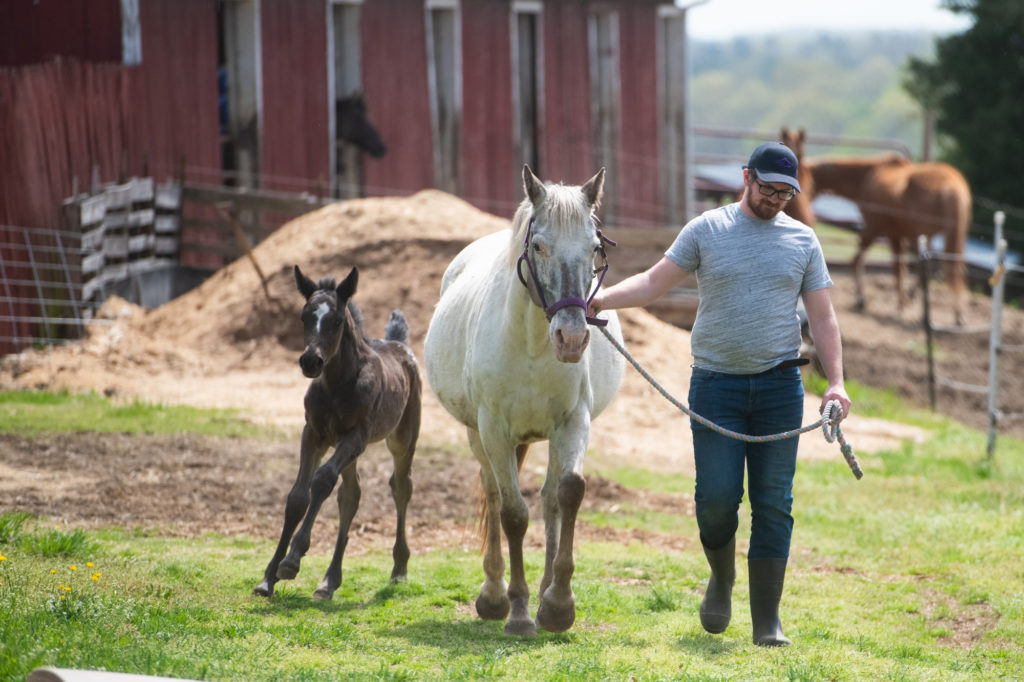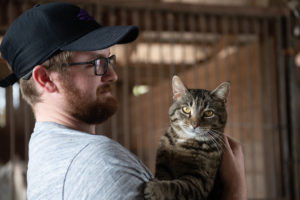Dylan Boggs ’19 hadn’t spent much time around horses until this past February, when he started doing an internship at Trinity Appaloosa Farm in his hometown of Brookneal, Virginia. Since then, the biology major has spent a lot of time — two days a week, eight to 10 hours each day — helping the farm’s owner, Tracy Meisenbach, get ready for the birthing and breeding seasons.
Among other things, Boggs has been helping perform ultrasounds on the pregnant mares and learning how to narrow down when a foal might be born. “Vienna is supposed to give birth in the next few days,” Boggs said via email on March 4. “We did a milk test … to get an estimate by testing how many parts per million of calcium were in her milk. That test estimated two to three days, so I should be getting the call relatively soon.”

A couple of weeks passed, however, and Vienna still hadn’t gone into labor. Another thing Boggs has learned during his internship is that horses operate on their own schedules. As he puts it, “Horses seem to have a mind of their own and know when they want to give birth.”
By mid-March, the birth seemed imminent, but still, nothing. “Our horse has been stubborn this week,” Boggs said of Vienna on March 17. “We noticed her looking to be having contractions and then just decide not to have the baby.
“I never knew a horse could ‘decide’ when they’re having a baby, but apparently they do this in the wild, too. I know it can’t be much longer before she gives birth. Her calcium, in parts per million, is where it is expected to be if she’s only a day or so away.”
Vienna gave birth the following day to a filly named Chantilly. Unfortunately, Boggs was unable to witness the blessed event as he was rehearsing with the University of Lynchburg Wind Symphony at the time. He reported a week or so later, however, that Chantilly was “doing pretty well” and “had doubled in weight since being born.”
He added, “She’s got an attitude on her, too. She did not want to be petted, but we’re working on that.”
There will be more foals born this spring, perhaps as many as 10, Boggs said, and with the advent of warmer weather, he’ll start to help with breeding as well. “So far, my favorite part about the internship is just the hands-on experience I’m getting,” he said, adding that his professor and advisor, Dr. Takashi Maie, reinforced the value of that recently.
“Dr. Maie said something along the lines of ‘We in academia have to respect those out in the field. We learn from books; they learn by experience.’ That really hit home for me. I love being able to come to his office and discuss the things that I did while out at the farm, and different things we will do when we get the opportunity, and that sort of thing.”

Dr. Maie, an assistant professor of biology at Lynchburg, went to the farm recently to visit his student and the new filly. He took along his two children, ages 3 and 5. “That was amazing,” he said. “It’s an experience I like students to have outside of the classroom. I don’t get to have students experience that in my classroom.”
While at the farm, Dr. Maie said he saw Boggs handling the newborn foal and helping with the ultrasound of a pregnant — also called “gravid” — mare. “Tracy, the person who owns the farm, was going through the ultrasound, just to make sure [of] the position of the fetus in this pregnant horse,” Dr. Maie said.
After she demonstrated the ultrasound process, Boggs followed suit. “It was a very interesting experience for me,” Dr. Maie said.

Boggs said he and Dr. Maie had been talking about possible internships and the farm, which breeds Appaloosas and American Sugarbush Harlequin Draft horses, came to mind. “My site instructor is well-known in the town and when Dr. Maie and I were discussing potential internships, this one stood out since it is in my hometown,” Boggs said.
“It’s only about a 40-minute drive [from Lynchburg], it’s related to biology, and I love to work with animals. Dr. Maie agreed to be my faculty advisor on the internship and has loved what I’ve been doing at the farm so far.”
This is the first internship Dr. Maie has supervised at a horse-breeding farm. “Typically, my students go through hospitals and labs to have internship experience, but this is my first time to have a student do an internship at a real farm, dealing with live animals,” he said.
Dr. Maie said he would like to see future students have similar experiences. “If Tracy is interested in continuing to provide internship opportunities to students I would love to provide support,” he said.
Boggs also presented research from his internship at the University of Lynchburg’s Student Scholar Showcase on April 10. The annual event provides students with an opportunity to present their scholarly, research, creative, and/or service-learning projects to the campus community.

